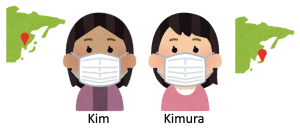Module 9.1 Dialogue
Title
Ms. Kim and Ms. Kimura talk about where they came from

| Language | Script and Translation |
Japanese |
|
Romanization |
1 Kimura: Kimu san wa nani jin desu ka?
2 Kimu: Kankoku jin desu. Souru kara kimashita. 3 Kimura: Sou desu ka. Watashi wa Toukyou kara kimashita. |
English translation |
1 Kimura: Ms. Kim, what nationality are you?
2 Kim: I am Korean. I came from Seoul. 3 Kimura: Really? I came from Tokyo. |
Kim voice recording: https://ttsmp3.com/text-to-speech/Japanese/
Vocabulary
Grammar Notes
| 〜から来ました (〜kara kimashita) |
〜から, a particle, means “from”.
〜から来ました (~kara kimashita) is used to describe where one came from. For example, a continent, country, state/prefecture, or city
来ました (kimashita), “came”, is the past tense of 来ます (kimasu)/来る (kuru)
どこから来ましたか (doko kara kimashita ka) can be used to ask where one comes from. This is an alternative way to ask ご出身はどこですか (goshusshin wa doko desuka?) learned in the previous two modules.
When asked, replace どこ (doko) with the city, state/prefecture, country, or continent name.
| そうですか (soudesuka) |
そうですか (soudesuka) is a very commonly used phrase. It means “I see!”, “Is that so?” or “Really?” It can be used as a reaction to someone’s speech to express “surprise” or “finding out new information”.
It sometimes also can be used to indicate that the listener is listening to the speaker.
きむら
なにじん
かんこくじん
き
わたし
とうきょう
しゅっしん
